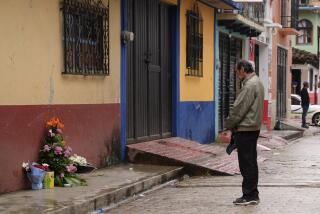Activists Shun Panel Probing Guatemala Bishop’s Slaying
- Share via
SAN SALVADOR — Human rights activists who worked with slain Guatemalan Bishop Juan Jose Gerardi no longer trust and have broken off communications with the high-level government commission assigned to investigate his brutal April killing, the activists said Wednesday.
The Archbishop’s Office on Human Rights cut off contact with the commission because the panel has not acted on information the office provided that may link two military officers to the slaying, they said.
Loss of support from the human rights office, which Gerardi founded, is a blow to the Guatemalan government’s credibility in a case that is seen as a test of its commitment to holding accountable those who abuse human rights and controlling the powerful armed forces almost two years after an agreement ended more than three decades of guerrilla war.
“Losing the confidence of the human rights office and, by extension, of the [Roman Catholic] Church would be a very serious thing,” said Hugh Byrne, Guatemala expert for the Washington Office on Latin America, a Washington-based think tank. “They are the representatives of the project that Bishop Gerardi was working on. They are the people that many people will look to” when judging the government investigation.
Gerardi’s skull was crushed with a piece of concrete three days after he presented the first part of a four-volume report on human rights abuses committed during the U.S.-backed civil war. The timing and brutality of his slaying raised suspicions of an assassination in Guatemala, which has a history of political killings disguised as common crimes.
President Alvaro Arzu appointed a high-level commission--including his personal assistant, the interior minister and Marta Altolaguirre, president of the National Human Rights Commission--to oversee the investigation. A prosecutor is actually conducting the probe and will not show commission members the results of the probe until they are presented to a judge Aug. 5, Altolaguirre said.
But activists were angered when, two weeks after the cleric’s killing, they passed on anonymous tips to the commission and prosecutor--leads they believed were never followed up.
They told the panel that informants had suggested investigations of a retired officer and a member of the elite military corps assigned to protect Arzu, said Nery Rodenas, head of the office’s legal section.
The retired officer had been accused before of human rights abuses, said Hellen Mack, a well-known activist who works closely with the office. Neither Rodenas nor Mack would name the officers, and neither knew whether either military man was implicated in Gerardi’s report.
Mack said that these leads were insufficiently examined and that, instead, activists were told the investigation would focus on two suspects, who are under arrest, and on evidence that has been sent to the FBI laboratory in the U.S.
But many Guatemalans believe that the suspects in custody are scapegoats. Both are poor men who were seen at a park near the bishop’s residence frequented by vagrants. “This is a joke,” Mack said.
While Altolaguirre denied friction between the government panel and the activists--who she said had been out of town and unavailable for meetings--at least one activist has griped about the investigation. Ronalth Ochaeta, director of the human rights office, complained publicly in Spain that the commission had failed to act on the leads about the officers.
Lt. Col. Edith Vargas, an army spokeswoman, urged Ochaeta to provide proof, not just suspicions, about the officers to prosecutors.
More to Read
Sign up for Essential California
The most important California stories and recommendations in your inbox every morning.
You may occasionally receive promotional content from the Los Angeles Times.













